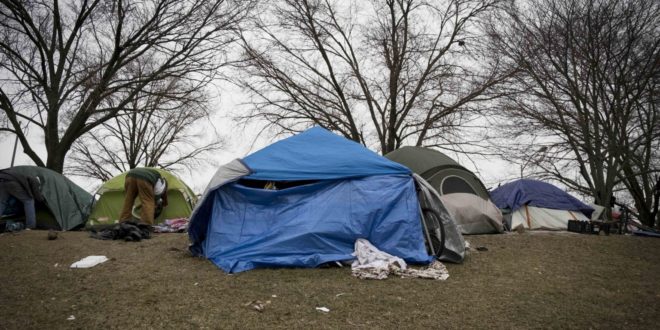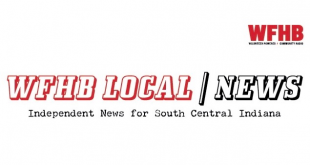Podcast: Play in new window | Download (Duration: 7:45 — 7.1MB)
This interview has been lightly edited for brevity and clarity.
Aaron Comforty: The City of Bloomington gave notice last week that it would evict the encampment of unhoused people at Seminary Park on January 11th. January 11th is today, and a number of civil society groups, non-profits, politicians, and prominent community members signed on to an open letter which urges Bloomington Mayor John Hamilton to call off the City’s planned eviction. One of the signatories of that letter is Matt Flaherty. He is an At-Large Representative of the Bloomington City Council and joins us now on WFHB Local News to talk about the issue and his decision to sign onto the open letter. Council-Member Flaherty thanks for coming on the show.
Matt Flaherty: Thank you for having me, and thanks for discussing these important issues in our community.
Comforty: What’s your understanding of the Mayor’s plans in regards to clearing tents at the encampment, and why did you decide to sign on to this open-letter?
Flaherty: Sure, first I’d like to say that I know Mayor Hamilton and his team are working hard and are doing what they think is best. I appreciate that, regarding the proposed January 11th action, they had provided notice, and I think some greater property protection provisions than the previous eviction of Seminary Park in early December. But that said, as a matter of public health policy, I just strongly disagree with their proposed course of action. And I agree with the sentiments of Beacon Inc. and many other community members, including those who signed onto a Change.org petition regarding the same subject. I agree with the sentiments shared by those community individuals, and the arguments they’ve shared. So that’s why I decided to elevate their work and sign on to that letter.
Comforty: You mention Beacon Inc., which is a community organization dedicated to solutions for people in poverty. That organization authored the letter. They recently counted almost forty individuals who, it says, are sleeping in the Seminary Park Encampment. The letter also notes that area homeless shelters are at or are near capacity. Council Member Flaherty, what should Bloomington do right now to address the urgent issue of homelessness at Seminary Park and in Bloomington in general?
Flaherty: I think you highlighted some important facts there. We have, what’s sometimes called a “street homeless population,” or people literally experiencing homelessness who are not in shelter at all. That is really unprecedented for this time of year for us. Including some other areas, there may be as many as sixty or more people currently sleeping outside in Bloomington. We know that we do not have enough shelter beds for them, which is why I think it’s really important not to to evict anyone from a park or surrounding area at this time. As we saw in early December, when that happened, even though there was ostensibly shelter space available, many individuals did not feel safe or comfortable going to shelter. As such, most of them dispersed into the community, where service providers, advocates, and helpers, like the Bloomington Homeless Coalition, did not know how to find them. I think that that increases the danger and undermines the safety of some of our most vulnerable community members. So I think most immediately, we need an extended moratorium on the proposed eviction, at least through the end of the Covid-19 emergency, as well as more support for those in the Seminary Park area, in particular through the provision of bathrooms and hygiene stations and frequent trash service. I realize of course, that it’s not ideal for anyone to be sleeping outside. This is about reducing harm in the immediate term. I think much better would be to have individual housing options for those who are currently unsheltered and sleeping outside. That’s what the CDC recommends, and that’s what we don’t have. That’s perhaps a big lift. The CDC recommends hotels and motels for people who are at high risk for Covid-19 and currently unsheltered. We really need to bring the Trustees and the County Governments and all community advocates on board to develop solutions to this problem. That, again, is what the Beacon Inc. letter has called for. That’s what I’ve called for, and what some of my colleagues have called for. We really need to take to heart the idea of a whole-community approach to solutions here, and we need to start working more collaboratively.
Comforty: The CDC gave guidance early on in the pandemic that discouraged officials from removing people from homeless encampments, citing the fact that doing so could increase the spread of Covid-19. Mayor Hamilton’s approach to responding to the needs of the unhoused community in Bloomington, has at times seemed at odds with the approach that you’re advocating for. It’s been almost a year, and the City of Bloomington has not installed bathroom facilities at the park, for example. What can you do on the City Council to implement some of the actions that you’re calling for?
Flaherty: Good question. I agree, again, that we aren’t doing a good job of following the CDC guidelines, and my colleagues and I have been advocating for a different approach. These are things that are traditionally in the purview of the Executive, under the Mayor and the folks who report to him, whether it’s the Bloomington Police Department, the Parks Department, or the Board of Park’s Commissioners, which also oversees some of the rule making in regard to parks. That said, the Council is the legislative and fiscal body of the City, and there are legislative options here. In particular, Indianapolis, some years ago, passed with pretty overwhelming support from both Republicans and Democrats on their City Council, some protections for their unhoused population, including: notice, protection of property if an encampment were to be cleared, and a prohibition on clearing such an encampment if transitional housing options and permanent housing are not available. There are other legislative options that we can look at. We could potentially require certain things that would help folks who are living outside, like access to bathrooms. So far, mainly, we’ve been asking for those things, because they really are outside the Council’s normal function. But increasingly, some of my colleagues and I have been looking at legislative solutions. I’ll just note that some of those things do cost money, and I can commit to supporting funding them if they are funding levels that amount to City Council approval. Just a quick note on that as well: we can’t, as a Council, bring an appropriation ordinance or decide what to fund or what not to fund. By state statute, we rely on the Executive to bring an appropriation ordinance to us that we then have to vote on. So we really do have to collaborate with and have cooperation from Mayor Hamilton to do some of these things. But again, we are looking at legislative tools that we have, if it’s the will of the Council–the majority of Council Members, to take a different approach to some of these challenges in our community.
Comforty: Council-Member Matt Flaherty is a Bloomington City Council At-Large Representative. Council Member Flaherty, thank you for speaking with us on WFHB Local News.
Flaherty: Thank you for having me.
 WFHB Bloomington Community Radio
WFHB Bloomington Community Radio


